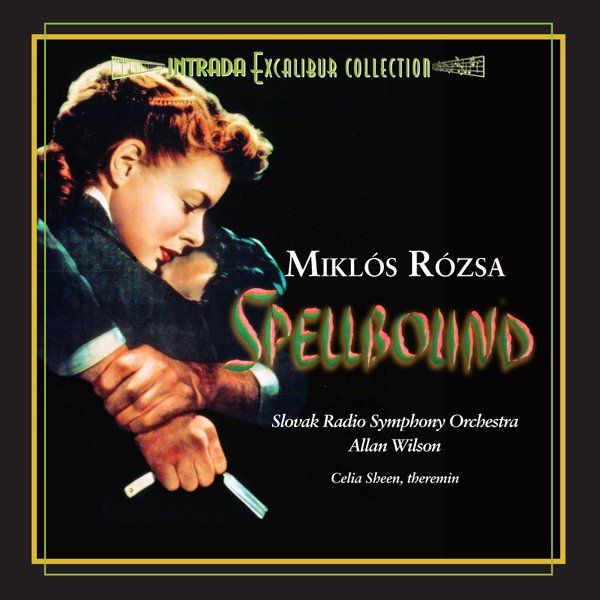Spellbound

Label: Intrada Excalibur Collection
Catalogue No: MAF 7100
Release Date: Apr-2007
Total Duration: 73:31
UPN: 7-20258-71002-4
Slovak Radio Symphony Orchestra conducted by Allan Wilson
Miklos Rozsa’s love theme for Spellbound was the closest the composer came to having a popular “hit” tune which resonated with the public. He once described it as his most “durable” score in view of the numerous recordings which had been made, and indeed which continue to be made, of the main theme and the Spellbound Concerto. In 1958 Warner Bros issued a stereo LP of the score with Ray Heindorf conducting the Warner Bros Studio Orchestra. It was a reasonable good interpretation, although somewhat removed from the original soundtrack, partly due to changes in the orchestration.
This recording with Allan Wilson conducting the Slovak Radio Symphony Orchestra contains music from the complete film score for the first time. The initial surprise is that instead of hearing Alfred Newman’s Selznick Studio fanfare introducing the score, we hear Rozsa’s previously unheard fanfare which was written for the film but not used. Having become accustomed to hearing Newman’s fanfare which segues into Rozsa’s opening timpani roll for the “Main Title” it comes as something of a jolt to hear Rozsa’s alternative. It’s perhaps not surprising that producer David O Selznick decided to keep Newman’s version because it had already become firmly established as the Selznick Studio fanfare and Rozsa’s alternative does not attempt to emulate the same sort of studio fanfare portentousness.
The themes from Spellbound are, of course, very familiar. There is much valuable additional music on this CD, in the way of extended and deleted tracks; even if there is not a great deal of new thematic material. Highlights of the CD and the score are contained in such tracks as the delightful scherzo in “First Meeting” and the unsettling paranoia theme; especially effective in the “justifiably celebrated” (as the liner notes rightly say) track “The Razor”. Some of the most valuable tracks are those which have never previously been recorded e.g. “Ski Run” and “The Revolver” both of which were completely cut from the film. “Ski Run” seems to have been composed for a longer cut of the ski sequence because the music runs considerably longer than the current scene in the film. The fast-paced, driving, ski theme is interspersed with dream-like music which presumably was intended to accompany the flashback Gregory Peck has to his childhood during the ski run.
It’s puzzling why “The Revolver” track was cut because it’s a far more suspenseful and dramatic piece than the Roy Webb music which was used in the picture as a substitute. Actually, about two seconds of Rozsa’s original music from this track can be heard in the film; just after the gunshot. “First Meeting” also contains additional music. This music serves as background to the lunch scene at Green Manors when Constance (Ingrid Bergman) is first introduced to Dr Edwards (Gregory Peck). Judging from the music on the CD Rozsa obviously scored the complete scene but in the film the music does not begin until Peck arrives in the room and, instead of hearing Rozsa’s original music at that point, we hear the love theme instead. This was no doubt the work of Selznick doing his customary cut and paste job on the music. The use of the love theme at that point certainly emphasises the immediate attraction between Bergman and Peck, even though it was obviously not Rozsa’s intention to introduce the theme that early in the film.
So for the first time, we have the complete music from Rozsa’s Academy award-winning score. But what about the performance and interpretation? Well, sad to say, this recording is something of a disappointment. Now – it is not reasonable or sensible to expect a re-recording to be a slavish copy of the original soundtrack but there is an expectation that it will be faithful to the original in terms of the inherent musical qualities of the score. Unfortunately much of the music as played here is performed at a slow, cautious pace which robs the music of much of its appeal. The “Main Title”, in particular, is terribly sluggish. Was this a deliberate artistic decision? After all, many composers have preferred to conduct their own film scores at a more leisurely pace in order to bring out particular qualities within the music but it seems unlikely. There are several tracks, e.g. “The Picnic”, where the slower pace does give the music a more elegiac, haunting quality which is not unattractive and taken on its own musical terms without reference to the film, some listeners may be perfectly satisfied with the tempo. But tempo is not the only problem because the orchestra fails to bring to the fore the dramatic elements of the score with enough forcefulness. Much of the brass sounds muted and half hearted with the orchestra drawing out and extending the melody at the expense of rhythmic drive and energy. Rozsa was never sentimental when conducting his music, even when uncharacteristically wearing his heart on his sleeve, as with SPELLBOUND. But here, sentiment is overly prominent.
Intrada produced two of the most authoritive Rozsa re-recordings ever, with IVANHOE and JULIUS CAESAR, so it is extremely disappointing to have to make criticisms of this CD and somewhat baffling as to what went wrong. There is still much to enjoy in this recording but it is not the definitive version of SPELLBOUND as expected. Presentation, with an attractively produced 24 page booklet, is well up to Intrada’s usual high standards.



